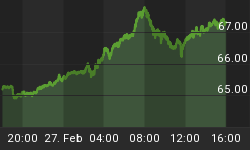Here is a quick follow-up on yesterday's column, along with an administrative note (at the end). Yesterday, I noted there that momentum investors will begin to lose interest in being long equities as the year-over-year price return goes towards zero. I thought of another way to illustrate the same point, which maybe gets to something more like the average investor thinks.
The average "retail" investor wants big returns, but has a very non-linear response to losses. The reason that individual investors as a whole tend to under-perform institutional investors is that the former tend to exaggerate the effect of losses while underestimating the probability of losses. So, what tends to happen is that individual investors are perennially surprised by negative equity returns (don't feel bad - financial media is set up to reinforce this bias), and react harshly to mildly negative returns - but not harshly enough to significantly negative returns.
So, the chart below shows a simple calculation of the probability of an equity loss over the next twelve months assuming that the expected return is just the return of the last 12 months, and the standard deviation of the return is the VIX (and assuming distributions are normal...just to complete the list of improbable assumptions). This doesn't seem unreasonable with respect to assessing a typical investor's expectations: returns should continue, and volatility is forward-looking.

Maybe it's just me, but in these terms it seems more amazing. For much of the last few years, the trailing 12 month return was so high that it would take around a one-standard-deviation loss (16% chance) to experience a negative year - if, that is, we use prior returns to forecast future returns. In general, that's a very bad idea. However, I can't argue that this naïve approach has failed over the last few years!
What is the trigger that makes investors want to get out? After years of gains are investors going to act like they are "playing with house money" and wait until they get actual losses before they get jittery? Or will a 30-40% subjective chance of loss be enough for them to scale back? I think that this way of looking at the same picture we had yesterday seems much more promising for bulls. But, again, this is only true if valuation doesn't matter. Stocks look less scary this way...but this is probably not the right way to look at it!
**Administrative Note - I have just agreed to write a book for a terrific publisher. The working title is "What's Wrong with Money?: The Biggest Bubble of All - and How to Invest with it in Mind." I am very excited about the project, but it is a lot of work to turn the manuscript out by late August for publication in the fall. My posts here had already been more sporadic than they used to be, but now I actually have an excuse! If you would like to be on the notification list for when the book is published, simply send an email to WWWM@enduringinvestments.com and I will put you on the list!
You can follow me @inflation_guy!
Enduring Investments is a registered investment adviser that specializes in solving inflation-related problems. Fill out the contact form at http://www.EnduringInvestments.com/contact and we will send you our latest Quarterly Inflation Outlook. And if you make sure to put your physical mailing address in the "comment" section of the contact form, we will also send you a copy of Michael Ashton's book "Maestro, My Ass!"















